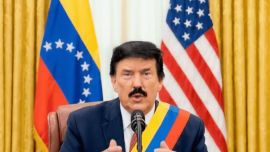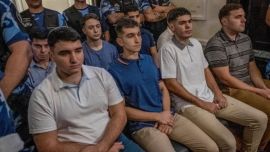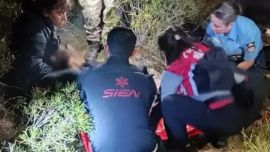Firebrand lawmaker Elisa 'Lilita' Carrió has confirmed she will step down as a national deputy in March next year and announced her departure from political life, saying she was stepping aside for a "younger" leader.
"I had to stay for the outcome of the PASOs, but now the Republic is already assured," said the legislator in announcing her decision.
"My political mission ended next year, I will begin my retirement immediately," Carrió, a key member of President Mauricio Macri's coalition, said Monday. "I withdraw from active politics, [although] if there is a crisis I will continue to be present."
The Coalición Cívica ("Civic Coalition") deputy presented a letter announcing her resignation, effective as of March 1, 2020, to the president of the lower house Chamber of Deputies, Emilio Monzó. It read that she had decided to give up "active politics."
The date of departure coincides with the day president-elect Alberto Fernández is scheduled to deliver a speech in Congress.
Technically, Carrió still has another two years of office to run after her strong re-election in the 2017 midterms, during which she headed the Cambiemos' list in Buenos Aires City.
According to sources consulted by the Noticias Argentinas news agency, in compliance with the Gender Parity Law, Carrió is likely to be replaced by PRO's Patricia Holzman, who has been working in the Environment and Sustainable Development Ministry.
Speaking to the TN news channel, Carrió said she would leave "active politics" but would carry on working privately for non-violent organisations for peace and "against all forms of genocide worldwide."
"Three years ago I had to retire," she said. "Twenty-five years in politics is a lot."
Controversial and outspoken
Carrió, a three-time presidential candidate who ran for the nation's highest office in 2003, 2007 and 2011, has been out of Argentina's most outspoken lawmakers for 25 years.
Born in Resistencia, Chaco, Carrió was a teen beauty queen in her younger years and her father who was involved with the Unión Cívica Radical (UCR). Entering politics under the invitation of mentor, former president Raúl Alfonsín, she was elected onto constituent body tasked with overseeing the the 1994 Constitutional Amendments Convention.
Her time as a national lawmaker dates back to 1995, when she was first elected as a national deputy running for the Radicals. She served uninterrupted until 2003, before returning in 2005 as a deputy for a stretch that runs until this day. Despite all her years in Congress, it is only during the last four years, as part of Mauricio Macri's Cambiemos coalition, that she has been on the same side as the ruling party.
An often controversial and outspoken figure, Carrió quickly became known for her fiery temperament and denunciations of governments of the day, especially alleged corruption. At the turn of the century she broke with the UCR definitively as the alliance that took Fernando de la Rúa to the Casa Rosada collapsed, going on in 2001 to form her own party, the Coalición Cívica ARI. That year, the party won 17 seats in the lower house and one Senate seat. In 2003, she took 14.1 percent of the national vote in the presidential ballot, losing to Néstor Kirchner.
The CC-ARI continued to grow, establishing itself in the capital, Buenos Aires Province and the southern province of Tierra del Fuego. In 2004, she founded the Instituto de Formación Cultural y Política "Hannah Arendt", which took its name from the German-American philosopher. In 2007, Carrió again ran in a presidential election, this time taking 23 percent and finishing behind Fernández de Kirchner, losing once again to a Kirchner.
Interestingly, Carrió has had a fiery but not always antagonistic relationship with former president Cristina Fernández de Kirchner. Analysts once saw them if not quite as friends, then acquaintances, with a certain affinity between the two in the late 90s in and around Congress as they both entered the legislative chambers. However, they then took very different political directions, with Carrió going onto to become one of Kirchnerismo's most vocal critics.
Speaking to TN, the national lawmaker said she had come to terms with the result of Sunday's election and said she felt no anger toward Fernández de Kirchner.
"The people have already chosen, this is democracy and I accept it," she said, in a surprising conciliatory tone.
"I hope that everything calms down. On my side they will not find or spite, or anger, or anything, because I have never had it with her [Fernández de Kirchner]," she added.
"I wish her the best for her daughter," the deputy continued, referring to Florencia Kirchner, who is undergoing medical treatment in Cuba. "Having a child with problems is not easy."
– TIMES/NA/PERFIL























Comments